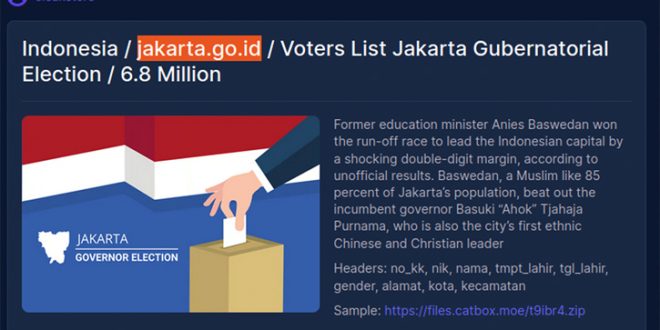Investigators from Resecurity’s HUNTER (HUMINT) have found that Indonesia is increasingly being targeted by cyber-threat actors who have staged attacks that pose significant long-term risks to the integrity of the country’s elections. These findings coincide with the critical and fast-approaching Indonesian presidential election set to take place in February this year (2024). This contest may have significant implications for the political destiny of the majority Muslim, Southeast Asian (SEA) nation, which is also the third-largest democracy in the world.

The country and its imminent power transition are definitely significant from geopolitical perspective that President Joe Biden and outgoing President Joko ‘Jokowi’ Widodo issued a joint statement in November last year announcing a “Comprehensive Strategic Partnership.” Publicized just before the start of the annual Asia-Pacific Economic Cooperation (APEC) leaders’ summit in San Francisco, this agreement marks an upgrade from the previous and less intimate “Strategic Partnership” the U.S. inked with Indonesia eight years ago during former President Barack Obama’s second term.
But as Washington jockeys for influence in Jakarta, so too is Beijing. In October, Chinese President Xi Jinping hosted President Widodo at the third Belt and Road Forum for International Cooperation. An official Indonesian government press brief published October 18 of last year issued a joint statement in partnership with Beijing announcing a “Deepening Comprehensive Strategic Cooperation between the People’s Republic of China and the Republic of Indonesia.”

The SEA nation is thus caught in a familiar tug of war between Eastern and Western superpowers that shaped its controversial political trajectory during the Cold War. Today, Indonesia is at a “critical crossroads for trade and a potential flashpoint for global conflict,” noted the South China Morning Post. Thus, Resecurity is specifically concerned that both foreign and domestic threat actors may exploit the sensitive personally identifying information (PII) of Indonesian voters obtained from various network intrusions to stage targeted information-warfare campaigns during the 2024 Indonesian election and beyond.
One particularly alarming breach tracked by HUNTER analysts led to the leak of 6.8 million voter records related to the 2017 Jakarta gubernatorial election on the ‘eleakstore,’ and on the Hydra Market cybercriminal forums in the TOR network. This breach not only exposed sensitive data but also served as a precursor to a significantly larger issue targeting the 2024 elections in Indonesia, which is described in further detail in this report.
2024 Indonesian Election Stakes:
According to the Carnegie Endowment for Peace, a think tank, the results of the 2024 Indonesian presidential election may herald a threshold moment in the country’s history that finally unclenches the old authoritarian-era elites’ dynastic grip on power. Thus, CEP believes this election could pave the way for a “new generation of kingmakers.”
An enduring symbol of the country’s pre-democratic old guard, “Indonesia’s leading presidential hopeful” is Prabowo Subianto, “a former special forces general who currently serves as defense minister,” according to Associated Press reporting. Prabowo is also the son-in-law of the late military dictator Suharto, who rose to power during the Cold War, and who ruled Indonesia with an iron fist for 32 years with the covert blessing of the Central Intelligence Agency.
Politically, Prabowo benefits from the endorsement of the iconoclastic and “immensely popular” President Widodo, who rose to power as an outsider, and as Prabowo’s political rival, in the 2014 election. Still, the CEP said many Indonesians still view the defense minister as a relic of the elitist plutocracy that seized power during Suharto’s brutal reign.
It is also noteworthy that President Widodo reportedly “forged a close relationship with Beijing” during his time in office, according to Radio Free Asia. A policy brief authored by think tank Celios in August largely described Prabowo as pro-Beijing. Beyond being a key member of Widodo’s government, which is “closely aligned with China’s interests,” noted Celios, “Prabowo has admiration for China.”
“Witnessing the fact that Prabowo’s positive outlook towards China was conveyed even before he ran for the 2019 Presidential General Election, indicates that his approach to China as President if elected in the 2024 elections, will most likely be in line with Jokowi’s policies in the current era, which have attracted a great deal of investment and projects from China over the last few years,” assessed the Celios policy brief.
In fact, the think tank noted that “intensive foreign involvement in Indonesia’s political landscape in recent years has elevated China to the leading position as Indonesia’s trade and investment partner.” Yet despite the growing ties between the two countries, “negative sentiment towards China continues to increase,” said Celios.
Many Indonesians distrust China due to a “number of issues such as China’s assertiveness in the South China Sea which threatens the sovereignty of Indonesia,” in addition to local concerns about “potential debt traps and environmental damage caused by Chinese companies operating in Indonesia,” according to Celios. The Indonesia-China relationship will thus be a key issue in the 2024 election that Prabowo, who recently made provocative, campaign-minded statements about growing popular disdain for Western values in Indonesia, and the other two leading candidates, pro-Western Anies, and pro-Beijing Ganjar Pranowo, must navigate. Click here to read the full report by Resecurity.
 InfoSecBulletin Cybersecurity for mankind
InfoSecBulletin Cybersecurity for mankind














